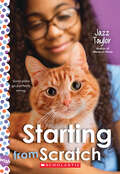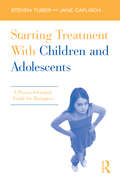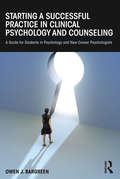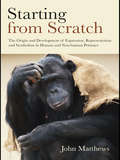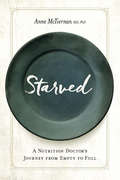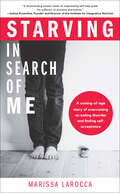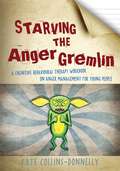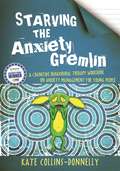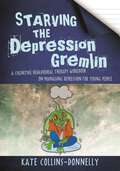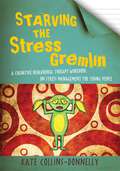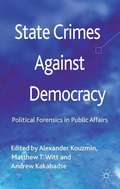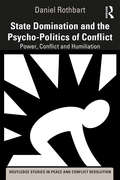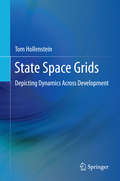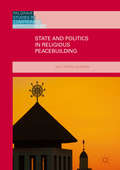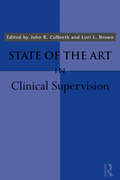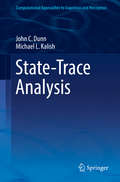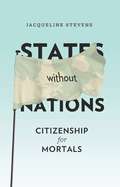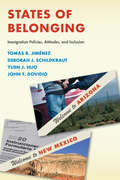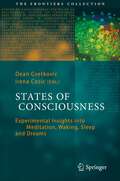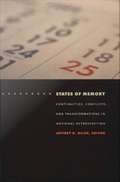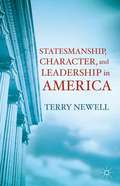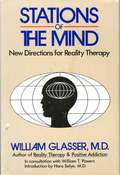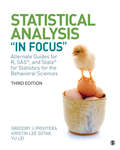- Table View
- List View
Starting From Scratch: A Wish Novel
by Jazz TaylorFrom the author of Meow or Never, a story about blended families, anxiety, and how a fresh start can be just what you need... even when you least expect it.Janie believes there's a best way to do everything. When she sticks to a schedule, she and her mom can tackle anything. But Janie's perfect schedule -- and her life -- are getting shaken up this year. Her new stepmom, Keisha, is moving in, along with her daughter, Makayla.Worst of all? Makayla brings a cat with her. And Janie hates cats.Even though it's hard, Janie tries to welcome Makayla to her new school. And honestly, she maybe does too good a job. Soon, Makayla is volunteering with Janie's beloved Sunshine Club, and Janie's friends all love her. The only one who pays any attention to her anymore is Makayla's nosy cat. It feels like her new sister is taking over! What's a gal to do with a copycat in her life?
Starting Treatment With Children and Adolescents: A Process-Oriented Guide for Therapists
by Steven Tuber Jane CaflischStarting Treatment With Children and Adolescents provides therapists with a time-tested framework for treatment and a moment-by-moment guide to the first few sessions with a new patient. In twelve remarkable case studies, verbatim transcripts of individual play-therapy sessions are brought to life through running commentary on techniques and theory and a fine-grained analysis of what worked, what didn’t, and what else the clinician could have done to make the session as productive as possible. Clinicians will come away from the book with a unique window into how other therapists actually work as well as new tools for engaging children and adolescents in process-oriented treatment. They’ll also be guided through an exploration of common questions such as how else could I have handled that situation? What other paths could I have tried? Where might those other paths have led? What treatment strategies are most advantageous to my patients’ growth – and to my own?
Starting a Successful Practice in Clinical Psychology and Counseling: A Guide for Students in Psychology and New Career Psychologists
by Owen J. BargreenClinical psychology is a quickly growing profession, yet it is a challenging one: the preparation is arduous, the training is highly selective, and the results – an established and financially successful practice – are not easy to achieve. This book explains how to prepare for and surmount all of the hurdles presented to those who hope to eventually develop a lucrative and rewarding practice in clinical psychology. It is the first of its kind to focus primarily on financial success, though it does also look at the personal stresses and rewards of the profession. The author provides tips from his own experience and from other financially successful private practice psychologists and offers business techniques and pointers that are not explained in training programs. Undergraduate students contemplating a career in psychology will find advice on preparing for the GRE, applying to graduate schools, and getting involved in research and clinical work. For graduate students, an overview of a graduate clinical psychology program, preparing and completing a dissertation, and gaining experience in psychological testing are provided. Chapters then focus on how to build and manage a private practice, the best ways to manage personal and business finances, and how to practice good self-care. Additionally, the book includes a chapter by an expert on student-loan repayment that examines how to best work through the process of paying back student loans while building a practice.
Starting from Scratch: The Origin and Development of Expression, Representation and Symbolism in Human and Non-Human Primates
by John MatthewsThis book compares the beginning of symbolic thought in human infancy with that of our close primate relatives, the chimpanzees. The author investigates the precursors of symbolism by studying the actions and interactions of a small group of these intelligent, non-human primates who live in Singapore Zoo. Drawing upon his years of detailed observations, Matthews offers an in-depth analysis and interpretation of chimp behaviour to present an unprecedented account of the beginnings of symbolic thought. The book shows that the actions the chimpanzees perform have structural and semantic similarities with the actions of emergent expression and representation we find in human infancy. Of great importance is the finding that chimpanzee mark-making activity is not an artefact of human interference, but part of chimpanzee culture. Young chimpanzees seem to be introduced to acts of pretence and imagination by older and more experienced ones and taught the rudiments of expression, representation and symbolism. The implications for our understanding of symbolism, language, art and education are enormous, as are those about our origins and our place within nature. The book is written in an accessible style for both specialist and non-specialist readers, and illustrated with the author’s drawings and photographs.
Starved: A Nutrition Doctor's Journey from Empty to Full
by Anne Mctiernan"Failure to thrive" is not a phrase in this doctor's vocabulary.At the age of four, Anne McTiernan is left by her mother at a boarding school. Overcome by sadness from the neglect she experiences there, Anne emotionally and physically starves. A doctor, appalled by her excessive weight loss, forces Anne's mother to bring her home, but she is still not safe.Set in working-class, Irish-American Boston of the 1950s-1960s, Anne transitions from a malnourished state to obesity to obsessive dieting. Without love and support from her family, Anne decides she must take full responsibility for her own life during her last eighteen months as a minor.Today as a doctor and researcher, Anne has helped thousands of women improve their relationship with food-but this is not their story. Starved is the gripping tale of how Anne used hard work, undaunted intelligence, and persistence to turn the adversity she encountered as a child into a strength and set of skills that would later help her meet the demands of her career.ANNE McTIERNAN, MD, PhD, conducts research on the effects of diet, exercise, and weight loss on cancer and health. Currently, she is a professor at the Fred Hutchinson Cancer Research Center and the University of Washington Schools of Public Health and Medicine in Seattle, Washington.
Starving In Search of Me: A Coming-of-Age Story of Overcoming An Eating Disorder and Finding Self-Acceptance
by Marissa LaRocca“A heartrending memoir meets an empowering self-help guide” in this account of coming to terms with food, body image, and sexuality (Joshua Rosenthal, founder and director of the Institute for Integrative Nutrition).In this riveting, intimate book, Marissa LaRocca relates her own struggle living, for a time, in two closets: one to hide her eating disorder and one to hide her sexuality and very identity. As she unravels the emotional layers of her battle, she reveals the skills she learned that led her to find herself—and to eventually emerge as an outspoken advocate for gay rights and women’s health issues. She shares the hard-won wisdom she gained during her journey, to help you:Identify the root causes, symptoms, and triggers associated with an eating disorderAcknowledge the “life issues” that are being masked by “food issues” or other addictionsDisempower compulsive behaviors like binging, purging, and obsessing about calories and exerciseHeal your relationship with food through healing your relationship with yourselfEscape the victim role, become empowered, and take responsibility for your own happinessConnect with your life’s purpose and authentic self, transforming your weaknesses into strengthsFree your mind through tuning in to the body and witnessing emotionsImprove your body image and self-esteem by aligning your lifestyle with your true values and desires, and with what is realisticEffectively communicate your needs with confidenceEstablish guilt-free lifestyle boundaries to reduce anxiety and maximize vitalityEnhance peace of mind by developing a reliable support systemEliminate the need to be perfect by practicing forgiveness and compassion toward yourself
Starving the Anger Gremlin: A Cognitive Behavioural Therapy Workbook on Anger Management for Young People
by Kate Collins-DonnellyMeet the anger gremlin: a troublesome pest whose favourite meal is your anger, and the more he eats the angrier you get! There's only one way to stop him: starve him of angry feelings and behaviours, and make him disappear. This imaginative workbook shows young people how to starve their anger gremlin and control their anger effectively. Made up of engaging and fun activities, it helps them to understand why they get angry and how their anger affects themselves and others, and teaches them how to manage angry thoughts and behaviours. The tried-and-tested programme, based on effective cognitive behavioural therapy principles, can be worked through by a young person on their own or with a practitioner or parent, and is suitable for children and young people aged 10+. Starving the Anger Gremlin is easy to read and fun to complete, and is an ideal anger management resource for those working with young people including counsellors, therapists, social workers and school counsellors, as well as parents.
Starving the Anxiety Gremlin: A Cognitive Behavioural Therapy Workbook on Anxiety Management for Young People
by Kate Collins-DonnellyChildren's Choice Winner at the School Library Association's Information Book Awards 2014 The Anxiety Gremlin loves one thing - to feed on your anxiety! But watch out, as the fuller he gets, the more anxious you get! How can you stop him? Starve him of his favourite food - your anxiety - and he'll shrink and shrivel away. Starving the Anxiety Gremlin is a unique and award-winning resource to help young people understand different types of anxiety and how to manage them, including panic attacks, phobias, social anxiety, generalised anxiety and obsessive compulsive disorder. Based on cognitive behavioural principles that link thoughts, feelings and behaviours, the techniques described help young people to understand why they get anxious and how they can 'starve' their anxiety gremlin in order to manage their anxiety. This engaging workbook uses fun activities and real life stories, and can be used by young people aged 10+ on their own or with a parent or practitioner. It is also an ideal anxiety management resource for those working with young people, including mental health practitioners, social workers, education sector staff and youth workers.
Starving the Depression Gremlin: A Cognitive Behavioural Therapy Workbook on Managing Depression for Young People (Gremlin and Thief CBT Workbooks)
by Kate Collins-DonnellyHave you met the depression gremlin? He's a troublesome creature who likes nothing more than to feed off your low mood. And the more he devours, the bigger he gets and the more sadness you feel. But never fear - starve him of depression-related thoughts, feelings and behaviours and watch him shrink and shrivel away!Part of the award-winning Starve the Gremlin series, this engaging and accessible workbook helps young people aged 10+ to understand their feelings by explaining what depression is, how it develops and the impact it can have on the lives of young people. Based on the principles of cognitive behavioural therapy and packed with valuable tips and strategies, this workbook also aims to empower the reader to change how they think and act in order to manage their depression. Full of fun and creative activities, Starving the Depression Gremlin can help support and inform wider therapeutic work with young people with depression, and it can be used independently or with a parent or practitioner. It will be of interest to school counsellors, therapists, social workers, youth workers, teaching staff and other professionals working with young people.
Starving the Stress Gremlin: A Cognitive Behavioural Therapy Workbook on Stress Management for Young People
by Kate Collins-DonnellyWatch out for the Stress Gremlin - he loves to feed on your stress, and as he gets bigger and bolder, you get more and more stressed! How can he be stopped? Don't give him any more stress to eat, and watch him and your stress disappear! Starving the Stress Gremlin shows young people how they can manage their stress levels through a range of effective techniques based on cognitive behavioural principles. Engaging and fun activities as well as real life stories from other young people show how our thoughts are related to our behaviour and emotions, allowing young people to understand why they get stressed, the effects of stress and how to 'starve' their Stress Gremlin! This informative workbook is easy to read and fun for a young person aged 10+ to complete either on their own or with the help of a parent or practitioner. It is also a valuable stress management resource for those working with young people, including mental health practitioners, youth workers, social workers and education sector staff.
State Crimes Against Democracy: Political Forensics in Public Affairs
by Andrew Kakabadse Alexander Kouzmin Matthew T. WittAssembles leading theorists of a new paradigm of political theory, State Crimes Against Democracy , undertaking judicious and devoted hacking exposing the elusive nodes and circuitry that propagate elite dominance in world affairs, and what can be done to restore the demos to democracy.
State Domination and the Psycho-Politics of Conflict: Power, Conflict and Humiliation (Routledge Studies in Peace and Conflict Resolution)
by Daniel RothbartThis book offers a detailed study of the psycho-politics of governmental manipulation, in which a vulnerable population is disciplined by contorting their sense of self-worth. In many conflict settings, a nation’s government exerts its dominance over a marginalized population group through laws, policies and practices that foster stark inequality. This book shows how such domination comes in the form of systems of humiliation orchestrated by governmental forces. This thesis draws upon recent findings in social psychology, conflict analysis, and political sociology, with case studies of governmental directives, verdicts, policies, decisions and norms that, when enforced, foster debasement, disgrace or denigration. One case centers on the US immigration laws that target vulnerable population groups, while another focuses on the ethnic discrimination of the central government of Sudan against the Sudanese Africans. The book’s conclusion focuses on compassion-motivated practices that represent a counter-force to government-sponsored strategies of systemic humiliation. These are practices for building peace by professionals and non-professionals as a positive response to protracted violence. This book will be of much interest to students of peace and conflict studies, sociology, psychology, ethics, philosophy and international relations.
State Space Grids
by Tom HollensteinHuman development from birth through adulthood is a complex interplay of many interacting forces. Children's internal processes are manifest in behaviors that are sculpted by their experiences, most notably with primary caregivers. Because the discipline of psychology explores human behavior and cognition, the techniques employed for developmental analysis must be able to describe, depict, and quantify these complex processes. State Space Grids provides the framework, basic method, rationale, and advanced techniques for translating the behavior of children, adolescents, and parents into visible, traceable data. This seminar-between-covers takes readers step by step from conceptualization through implementation of projects, with examples from a range of current research within and outside child development. Links are included for the GridWare software program and related user resources. And although state space grids need not be used only to analyze dynamic systems, they serve as an excellent tool for honing systemic thinking. Key coverage in this volume includes: Dynamic systems and the origins of state space grids. The state of research using state space grids. Introducing GridWare and how it works. How to use state space grids, from idea through finished project. Within-grid and between-grid analysis. Conducting advanced analysis. State Space Grids is an essential reference for researchers across such disciplines as psychology, neuroscience, economics, computer science, and agricultural science.
State and Politics in Religious Peacebuilding
by Tale Steen-JohnsenIn this book, Tale Steen-Johnsen explains how religious peacebuilders are limited by both formal and more subtle political strategies aimed at regulating civil society. Political authorities have a vested interest in keeping social and religious movements under control, which limits the opportunities religious leaders have to diminish violent conflicts between religious groups. This volume offers empirical examples of these connections in Ethiopia, Kenya, Zanzibar and Tanzania. It is valuable resource for both scholars and development practitioners interested in how politics and religion become conflated when religious actors engage to build peace.
State of the Art in Clinical Supervision
by John R. Culbreth Lori L. BrownThere have been many recent developments in the research, theory, and practice of supervision in counseling, but few reliable resources are available for practitioners seeking to expand their knowledge in these areas. Culbreth and Brown have assembled a group of leading researchers, scholars, and professionals in the field to present a collection of chapters on the state of the art in clinical supervision. These chapters provide the reader with fresh approaches to core topics, such as multicultural competence, religion and spirituality, and the training of supervisors, as well as discussions of new areas of study. Alternative methods to conducting supervision are explored with expressive art techniques and the uses of narrative therapy and concepts of emotional intelligence. Triadic supervision and the use of the newest developments in technology are also considered. Current and future supervisors will no doubt find the innovative and informative strategies described in this book invaluable in their work with supervisees.
State-Trace Analysis (Computational Approaches to Cognition and Perception)
by John C. Dunn Michael L. KalishThis book provides an introduction to the theory, method, and practice of State-Trace Analysis (STA), and includes a detailed tutorial on the statistical analysis of state-trace designs. The book offers instructions on how to perform state-trace analysis using the authors' own publicly-available software in both Matlab and R. The book begins by discussing the general framework for thinking about the relationships between independent variables, latent variables, and dependent variables. Subsequent chapters provide a software package that can be used to fit state-trace models as well as additional designs and examples. The book concludes with a discussion on potential extensions of STA and additional aspects of its application. State-Trace Analysis will be of interest to researchers and graduate students working in experimental, applied, and cognitive psychology.
States Without Nations: Citizenship for Mortals (New Directions in Critical Theory #34)
by Jacqueline StevensAs citizens, we hold certain truths to be self-evident: that the rights to own land, marry, inherit property, and especially to assume birthright citizenship should be guaranteed by the state. The laws promoting these rights appear not only to preserve our liberty but to guarantee society remains just. Yet considering how much violence and inequality results from these legal mandates, Jacqueline Stevens asks whether we might be making the wrong assumptions. Would a world without such laws be more just?Arguing that the core laws of the nation-state are more about a fear of death than a desire for freedom, Jacqueline Stevens imagines a world in which birthright citizenship, family inheritance, state-sanctioned marriage, and private land ownership are eliminated. Would chaos be the result? Drawing on political theory and history and incorporating contemporary social and economic data, she brilliantly critiques our sentimental attachments to birthright citizenship, inheritance, and marriage and highlights their harmful outcomes, including war, global apartheid, destitution, family misery, and environmental damage. It might be hard to imagine countries without the rules of membership and ownership that have come to define them, but as Stevens shows, conjuring new ways of reconciling our laws with the condition of mortality reveals the flaws of our present institutions and inspires hope for moving beyond them.
States of Belonging: Immigration Policies, Attitudes, and Inclusion
by Deborah J. Schildkraut John F. Dovidio Yuen J. Huo Tomas R. JimenezPolitical turmoil surrounding immigration at the federal level and the inability of Congress to pass comprehensive immigration reform have provided an opening for state and local governments to become more active in setting their own immigration-related policies. States largely dictate the resources, institutions, and opportunities immigrants can access: who can get a driver’s license or attend a state university, what languages are spoken in schools and public offices, how law enforcement interacts with the public, and even what schools teach students about history. In States of Belonging, an interdisciplinary team of immigration experts – Tomás R. Jiménez, Deborah J. Schildkraut, Yuen J. Huo, and John F. Dovidio – explore the interconnections among immigration policies, attitudes about immigrants and immigration, and sense of belonging in two neighboring states – Arizona and New Mexico – with divergent approaches to welcoming newcomers. Arizona and New Mexico are historically and demographically similar, but they differ in their immigration policies. Arizona has enacted unwelcoming policies towards immigrants, restricting the access of immigrants to state resources, social services, and public institutions. New Mexico is more welcoming, actively seeking to protect the rights of immigrants and extending access to state resources and institutions. The authors draw on an original survey and in-depth interviews of a cross-section of each state’s population to illustrate how these differing approaches affect the sense of belonging not only among immigrants, but among the U.S.-born as well. Respondents in Arizona, regardless of whether they were foreign- or native-born or their ethno-racial background, agreed that the state is unwelcoming to immigrants, and they pointed to Arizona’s restrictive policies as the primary factor. The sense of rejection perceived by Latinos in Arizona, including the foreign-born and the U.S.-born, was profound. They felt the effects of administrative and symbolic exclusions of the state’s unwelcoming policies as they went about their daily lives. New Mexico’s more welcoming approach had positive effects on the Latino immigrant population, and these policies contributed to an increased sense of belonging among U.S.-born Latinos and U.S.-born whites as well. The authors show that exposure to information about welcoming policies is associated with an improved sense of belonging across most population groups. They also find that the primary dividing line when it came to reactions to welcoming policies was political, not ethno-racial. Only self-identified Republicans, Latino as well as white, showed reduced feelings of belonging. States of Belonging demonstrates that welcoming policies cultivate a greater sense of belonging for immigrants and other state citizens, suggesting that policies aimed at helping immigrants gain a social, economic, and political foothold in this country can pay a broad societal dividend.
States of Consciousness
by Irena Cosic Dean CvetkovicIn this accessible overview of current knowledge, an expert team of editors and authors describe experimental approaches to consciousness. These approaches are shedding light on some of the hitherto unknown aspects of the distinct states of human consciousness, including the waking state, different states of sleep and dreaming, meditation and more. The book presents the latest research studies by the contributing authors, whose specialities span neuroscience, neurology, biomedical engineering, clinical psychology and psychophysiology, psychosocial medicine and anthropology. Overall this anthology provides the reader with a clear picture of how different states of consciousness can be defined, experimentally measured and analysed. A future byproduct of this knowledge may be anticipated in the development of systematic corrective treatments for many disorders and pathological problems of consciousness.
States of Memory: Continuities, Conflicts, and Transformations in National Retrospection
by Jeffrey K. OlickStates of Memory illuminates the construction of national memory from a comparative perspective. The essays collected here emphasize that memory itself has a history: not only do particular meanings change, but the very faculty of memory--its place in social relations and the forms it takes--varies over time. Integrating theories of memory and nationalism with case studies, these essays stake a vital middle ground between particular and universal approaches to social memory studies. The contributors--including historians and social scientists--describe societies' struggles to produce and then use ideas of what a "normal" past should look like. They examine claims about the genuineness of revolution (in fascist Italy and communist Russia), of inclusiveness (in the United States and Australia), of innocence (in Germany), and of inevitability (in Israel). Essayists explore the reputation of Confucius among Maoist leaders during China's Cultural Revolution; commemorations of Martin Luther King Jr. in the United States Congress; the "end" of the postwar era in Japan; and how national calendars--in signifying what to remember, celebrate, and mourn--structure national identification. Above all, these essays reveal that memory is never unitary, no matter how hard various powers strive to make it so. States of Memory will appeal to those scholars-in sociology, history, political science, cultural studies, anthropology, and art history-who are interested in collective memory, commemoration, nationalism, and state formation. Contributors. Paloma Aguilar, Frederick C. Corney, Carol Gluck, Matt K. Matsuda, Jeffrey K. Olick, Francesca Polletta, Uri Ram, Barry Schwartz, Lyn Spillman, Charles Tilly, Simonetta Falasca Zamponi, Eviatar Zerubavel, Tong Zhang
Statesmanship, Character, and Leadership in America
by Terry NewellNewell examines noted Americans at seven critical turning points in American history to look at what it takes to be a statesman. Through a powerful speech and the events preceding and following it, they show us how they grappled with conflicting values, varying demands, and the uncertainties of trying to forge a good society.
Stations of the Mind
by William GlasserStations of the Mind is a logical and necessary expansion of William Glasser's basic Reality Therapy ideas, an expansion which began with Positive Addiction about meditation, running, and other "good" addictions. In clear, nontechnical language, this book tells how our brains function in living-specifically what we do, think, and feel. Any reader can use it to make a major impact on the social sciences, medicine, and the growing field of meditation. Dr. Glasser's thesis, based on the Control System Psychology of William Powers, a student of cybernetics and consultant on this book, is that we, like all living creatures, are internally motivated. All of us are driven by powerful internal forces that push us not only to survive, but toward belonging, worthwhileness, fun, and freedom. From these and perhaps our other basic needs, we construct a complex, unique a personal world. Our brain then acts as the control system that deals with the real world to try and control it so that it comes as close as possible to our personal world. Glasser points out that what happens outside us in the real world is of little or no significance unless it relates to what is already inside us in our personal world. This new, human, internally motivated psychology contrasts sharply with the standard, external, mechanical, stimulus-response behavior psychology currently so popular. Glasser strips away much of the mystery that has surrounded the workings of our mind. Those who read the book carefully need never again be puzzled as to how we behave or about many of the whys of our behavior. It explains the common psychological upsets-from acting out to depression, from nonmedical pain and disability to psychoses. Dr. Glasser sets forth a new usable explanation of how addictive drugs work in the brain and why we use them. He also explains how our brain malfunctions and causes us to suffer psychosomatic illnesses. Finally, as we understand how our brain struggles to fulfill our needs, we will gain valuable insight into our most pressing social problem-how to get along with each other; that must come through negotiation and compromise. Our brain is not built to do otherwise. Here is a carefully developed thesis, a clear explanation of complex ideas, and a wide variety of ways that we can use them in our lives and our work.
Stationäre Psychodynamische Psychotherapie: Ein Leitfaden für Theorie und Praxis (Psychotherapie: Praxis)
by Christian DürichIn diesem Buch erfahren Ärzte, Psychologen und therapeutisches Klinikpersonal, wie die Psychodynamische Psychotherapie im Rahmen eines integrativen Behandlungskonzepts stationär als eigenständiges Therapieverfahren umgesetzt wird: Ausgehend von intersubjektiven und gruppenanalytischen Entwicklungen aus Tiefenpsychologie und Psychoanalyse wird dargestellt, wie Übertragungs- und Gegenübertragungsanalyse als beziehungsreflexiver Teamprozess angewendet werden können, um konfliktneurotische, strukturelle und Traumafolgestörungen fundiert psychotherapeutisch zu behandeln. Aus dem Inhalt: Mit Fokus auf die Operationalisierte Psychodynamische Diagnostik werden psychische und psychosomatische Krankheitsbilder von Angst- bis Zwangsstörungen mit ihren Psychodynamiken und Beziehungsaspekten inklusive Fallbeispiele zum Nachschlagen zusammengefasst. Ergänzende Perspektiven bieten die störungsorientierte Integration psychotherapeutischer Methoden wie z. B. Stabilisations- oder Konfrontationstechniken sowie die Bezugnahme auf aktuelle Leitlinien. Ausführungen zu Indikationsstellung, Evaluation und Evidenz runden den Überblick ab. Über den Autor: Dr. med. Christian Dürich, Facharzt für Psychosomatische Medizin und Psychotherapie und Psychoanalytiker/Gruppenanalytiker, ist Chefarzt der Psychosomatik am Katholischen Krankenhaus Hagen. Er ist weiterbildungsermächtigter Arzt der Ärztekammer Westfalen-Lippe und Vorsitzender der Westfälischen Arbeitsgemeinschaft für Psychosomatik, Psychotherapie und Psychoanalyse.
Statistical Analysis "In Focus": Alternate Guides for R, SAS, and Stata for Statistics for the Behavioral Sciences
by Dr Gregory J. Privitera Yu Lei Kristin L. SotakStatistical Analysis "In Focus": Alternate Guides for R, SAS, and Stata for Statistics for the Behavioral Sciences, Third Edition supports users of Gregory J. Privitera’s Statistics for the Behavioral Sciences, Third Edition who work with a statistical program other than SPSS or Excel. Three standalone parts, each dedicated to R, SAS, and Stata, serve as step-by-step guides for completing the “In Focus” exercises in Privitera’s core text. Gregory J. Privitera, Kristin Lee Sotak, and Yu Lei’s conversational writing style along with “To The Student” introductions allow students to familiarize themselves and become more comfortable with each program prior to making computations. Additionally, General Instruction Guidebook (GIG) sections for R, SAS, and Stata provide standardized how-to instructions for using each program, making the book a valuable reference for students beyond their studies.
Statistical Analysis "In Focus": Alternate Guides for R, SAS, and Stata for Statistics for the Behavioral Sciences
by Dr Gregory J. Privitera Yu Lei Kristin L. SotakStatistical Analysis "In Focus": Alternate Guides for R, SAS, and Stata for Statistics for the Behavioral Sciences, Third Edition supports users of Gregory J. Privitera’s Statistics for the Behavioral Sciences, Third Edition who work with a statistical program other than SPSS or Excel. Three standalone parts, each dedicated to R, SAS, and Stata, serve as step-by-step guides for completing the “In Focus” exercises in Privitera’s core text. Gregory J. Privitera, Kristin Lee Sotak, and Yu Lei’s conversational writing style along with “To The Student” introductions allow students to familiarize themselves and become more comfortable with each program prior to making computations. Additionally, General Instruction Guidebook (GIG) sections for R, SAS, and Stata provide standardized how-to instructions for using each program, making the book a valuable reference for students beyond their studies.
